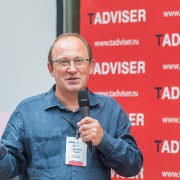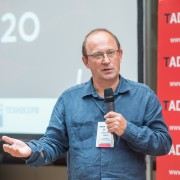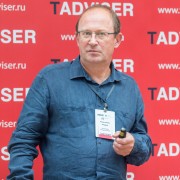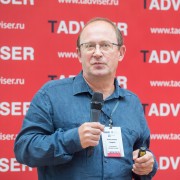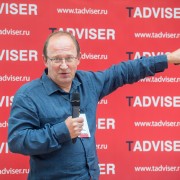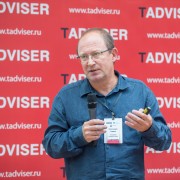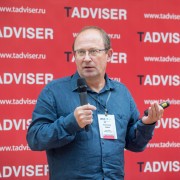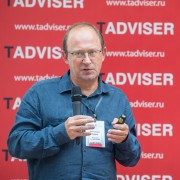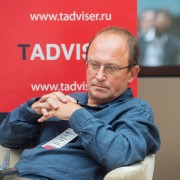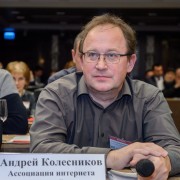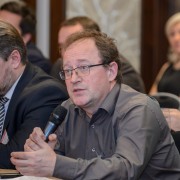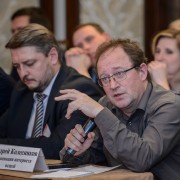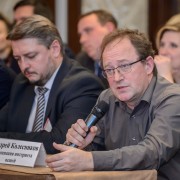Content |
Andrei Kolesnikov has been working in the field of telecommunications since 1988 and took part in the delegation of the national domain.RU in 1993.
In 1995, Andrei Kolesnikov led the launch of Russia's first mass Internet service, Russia-On-Line, and from 2005 to 2009 he was a member of the board of the Coordinating Center of the National Internet Domain. Since March 2009, Kolesnikov served as director of the Coordination Center, and after the expiration of his term of office he was appointed to this position for the second time.
2009-2010: Confrontation with Ru-Center
Until 2001, there was only one organization in Russia that registered domains in Runet - RosNIIRos. In 2001, Ru-Center was separated from this institute.
At the end of 2003, RU-CENTER, together with RosNIIROS (which left part of the domains to itself) owned 87.4% of the domain name market in the RU domain. The increase in the number of registrars did not affect the redistribution of the market too much - all attempts by the Coordination Center to somehow change the situation and allow new registrars to work normally in the market ran into active resistance from the members of the council and board of the CC, who represented RU-CENTER.
The situation began to change only with the arrival in 2009 of the director of the CC Andrei Kolesnikov. He once stood at the origins of the creation of a distributed registration system in the RU domain and was one of the "founding fathers" of the Coordination Center. And his activities were largely aimed precisely at somehow reducing the monopoly of RU-CENTER and providing the conditions for the emergence of new registrars and more intensive development of those that already existed at that time. For a year and a half of his work, 5 new registrars appeared, and the market share that RU-CENTER occupied at that time in the RU domain decreased to 33%. It is clear that such a policy greatly worried the management of RU-CENTER - this is not only a blow to the image of the company, which in fact, until 2009, in the eyes of runets looked like the main and almost the only carrier of the RU domain, but also a very noticeable decrease in revenues.
The launch of a new domain of Russia of the Russian Federation was considered by the leadership of this registrar as an opportunity to take revenge and restore both its monopoly on the national domain and the level of its income. Well, for this, of course, it was necessary for all truths and untruths to ensure that the domain of the Russian Federation was associated with Runet users exclusively with RU-CENTER, and not with other registrars, and even more so not with the Coordination Center.
For this, RU-CENTER began the most active promotion of the domain of the Russian Federation, both in quite legal and open ways, and in not entirely honest ways, which will be discussed below. Actually, until a certain moment, this registrar behaved like any other company that wants to get ahead of its competitors and occupy the maximum market share. But the methods that RU-CENTER acted on are far from always honest.
For example, in the spring of 2009, RU-CENTER sent several thousand letters to various state and municipal structures with suggestions to choose RU-CENTER as a registrar, where it indicated that domain applications should be sent to the Coordination Center, and copies sent to RU-CENTER. As a result, the Focal Point received 864 applications requesting registration of 7,161 domains, 491 of them for municipal authorities. At the same time, Lesnikov, as a member of the council, was aware that the provision on reserving domains for state needs had not yet been adopted by the CC council and that this list would be limited only by federal authorities, and municipal formations authorities would not receive any advantages. The focal point then had to allocate a significant part of the CC resources to process these letters of application and to explain the inability to satisfy most of them. RU-CENTER thus tried to get customers whose presence would significantly increase the status of this registrar as a "state."
In the fall of 2010, before the start of open registration in the domain of the Russian Federation, when the Coordination Center and Andrei Kolesnikov personally asked the RU-CENTER management to give priority to the municipal applications that the RU-CENTER itself provoked, Alexey Lesnikov refused to do this, and all these domain names went to the internal auction RU-CENTER. And these domains were transferred to municipalities only after the mass appearance in the media of letters from representatives of these bodies - that is, in no way by goodwill, but "under public pressure."
If you look at the chronology of events, then the situation with the auction in the domain. The Russian Federation developed as follows: Back in 2009, after accepting the application of Russia to the domain of the Russian Federation at ICANN, the Coordination Center planned to introduce this domain in several stages, including a period of premium registrations (a period with a phased decrease in the cost of domain name registration services of the second level in the domain. RF), i.e. the very notorious "Dutch auction." And until the fall of 2010, it was precisely about this method of distributing domain names in the Russian Federation. But at the end of the summer, the Federal Antimonopoly Service (FAS), i.e. the state, opposed this, so in early September 2010 the CC council decided not to hold an auction - by the way, the then representative of the state on the council, Alexei Soldatov, insisted on this . It is noteworthy that Alexey Lesnikov, a member of the CC council and director of RU-CENTER, also voted in favor of the decision to cancel the auction. He prefers to keep this silent, he is silent and that, in accordance with the regulations of the council of the Coordination Center, he, as a member of the council, had the opportunity to assemble an unscheduled meeting of the council and defend his point of view, which he later so actively propagated.
After this event, RU-CENTER, officially opposing the "big" auction, began to prepare an auction "at home," so to speak, privately. This is understandable: the general auction for this company was simply unprofitable, but after its cancellation, the chances of RU-CENTER getting a large number of "tasty" domains and further enrichment due to their actual resale at the company increased significantly. The coordination center knew about the upcoming auctions, so it posted an open letter to users on its website, which was immediately published by many media. Attempts by the leadership of RU-CENTER to find justification for their actions in the words of the director of the CC Andrei Kolesnikov do not stand up to any criticism: the only news that says that Kolesnikov allegedly supported the holding of auctions by the recorders does not have any confirmation. Not a single journalist who attended the press conference, according to the results of which the news was written, gave these words no more - only the representative of this respected news agency "distinguished himself," who either misunderstood something, or did not hear it, or even confused the author of the quotation. In all his interviews, which were published a lot before the launch of registration in the domain zone of the Russian Federation, Andrei Kolesnikov consistently spoke out against individual registrars holding their own auctions and warned of possible unpleasant consequences for both registrars and users.
Preparation for its own auctions was carried out by RU-CENTER earlier: for example, in May 2010, when RU-CENTER tried to arrange closed auctions for trademark owners, the Coordination Center was forced to freeze disputed domains until the violations were eliminated. Then RU-CENTER explained this with a "technical failure" and stopped the violations, rehearsing the launch of its auction and calculating the possible consequences of such actions.
The unfinished rules for holding an auction in the domain of the Russian Federation are most often called one of the main reasons for refusing to hold an auction and are reproached to the director of the CC. But there is one tricky detail here: the director of RU-CENTER Alexei Lesnikov, who later scolded these rules and called them "curves," was one of the members of the very working group of the CC registrars committee that developed these rules. What prevented Lesnikov from making the rules better and "straight" is not clear. Unless personal greed: according to information from some council members and from CC employees, Lesnikov demanded $40,000 for participating in the development of these rules, for which he was refused: the budget of the Coordination Center does not provide funds for such purposes.
Claiming that RU-CENTER was guided exclusively by the interests of its users when conducting auctions, its representatives, to put it mildly, were cunning. For example, take the same list of "auction" domains. When RU-CENTER was asked to provide a list of unfortunate "owners" of domain names won at the auction in order to have information about these actual administrators and in which case be able to restore their right to domain names, RU-CENTER sent... a plate with the names of more than sixty thousand domains in the format XN-- -: without details, contacts, names or at least some signs on which these "owners" could be installed. That is, today these "owners" are recorded only in the local registry of RU-CENTER, and in the main registry, where data are collected on all domain name administrators in the domain of the Russian Federation, there is only one administrator per 62000 domains - RU-CENTER. And there is no way to find out who all these people who won the auctions, how much they paid, whether there was deception from the organizers of the auction. Well, in addition, the list of domain names that RU-CENTER registered for itself hardly reflected the interests of ordinary users: the domains "проститутки.рф" and several hundred other similar ones registered by RU-CENTER are clearly not required by the ordinary runeter.
As for the international experience, which RU-CENTER and its representatives like to refer to, there is practically no international experience in conducting auctions in new country (ccTLD) domains. There are two reasons: firstly, the vast majority of the existing national domains were "launched" long before, how the domain space began to interest the public and business of these countries, and therefore all the "most delicious" domains are well in accordance with the rules and ICANN, and the national registrars were received by those who first made a fuss and understood, that a domain name is not just a registry entry, and a real source of additional income, popularity and the possibility of influencing others. Secondly, in accordance with ICANN recommendations, "the applicant must demonstrate a willingness to manage the root domain on the principles of equality and equal access to the local Internet public. The registration rules should clearly state that all people should be able to register domains with equal conditions, without giving any preferences to a certain segment of the Internet to the public. This is not considered correct if domain registration is limited to people in the country the domain serves. The constantly cited example with the restart of the Colombian CO domain and the fact that it was the auction held during the restart that helped avoid scandals and proceedings in this domain zone is completely incorrect. First of all, the state spoke out for the auction in this domain zone, which took an active part in the formation of both the rules for the auction and (importantly) the rules for the distribution of profits received from the auction. There are no more examples with auctions in country domains - in the EU domain, which they also like to refer to in RU-CENTER, the auction as such was not held, a number of "especially valuable" domain names were implemented by the domain administrator at an increased price. As for the example with the.ASIA domain, it is generally a public domain (gTLD) and was allocated to the operator by ICANN on quite commercial terms.
Further, in the fall of 2010, during the start of the open domain registration procedure in the.RF zone, Ru-Center collected preliminary applications for 25 thousand domains and put them up for auction, thus raising 366 million rubles. The general director of the CC Andrei Kolesnikov considered such actions a violation of the rules, since the domain should be registered in the interests of the first applicants, in addition, the registrar does not have the right to register domains for himself. But Kolesnikov's demand to stop auctions Ru-Center ignored.
Director of the Center for Strategic Studies "Other Europe" Pavel Levushkan in July 2011 commented on "NI"[1]: "Ru-Center actions are a classic example of cyber squatting. Having paid only 70 rubles for the most popular domain names. At cost, the company bought them up and sold at least 25 thousand domains at closed auctions at an average price of 5-7 thousand rubles. for each. "
2013: Interview
- Andrey Kolesnikov: Software developers do not yet understand the importance of full support for IDN domains (September 2013)
2015: Resignation from the post of head of CC
On October 5, 2015, it became known about the dismissal of Andrei Kolesnikov from the post of head of the Coordination Center of the national domain of the Internet (CC). This was reported by Vedomosti with reference to the director of the Regional Public Center for Internet Technologies (ROCIT, one of the founders of the CC) Sergey Grebennikov.
According to him, Kolesnikov's resignation took place "by agreement of the parties" and is associated with the task of updating the CC and strengthening its role among registrars. Kolesnikov confirmed his dismissal and announced plans to pursue his own projects. The new head of the CC has not yet been determined, but the candidacy is being discussed, said Grebennikov.
He did not give the reason for the dismissal of Andrei Kolesnikov, but the media is aware of her. According to the publication, in August 2015, a conflict broke out between the founders and the head of the domain administrator.ru and.rf. The founders of the CC made changes to the charter of the organization, according to which the supreme body of the Coordination Center was the general meeting of founders, and not an elected expert council, which includes a representative of the state. Kolesnikov said that he considers the registration of the new charter illegal, since this happened without the participation of the CC council and the director.
At first, it was planned to challenge the actions of the founders in court, but on October 5, 2015, Andrei Kolesnikov announced the absence of complaints against them, since they fulfilled all the conditions associated with the dismissal of the head of the CC. Kolesnikov says that the normal work of the CC is possible only if the founders do not radically change the team and give it unusual functions. The founders advocate the preservation of the CC team, said Sergey Grebennikov.[2]
2016: Russian Internet of Things Association
The Foundation for the Development of Internet Initiatives (FRII) together with the Moscow State Technical University (MSTU) named after N. E. Bauman created the Russian Association of the Internet of Things. Its chairman was elected Andrei Kolesnikov, who previously headed the Coordination Center of the national domain of the Internet ( CC).



